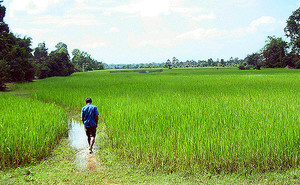In the wake of ‘El Nino Massacre’ in North Cotabato, IRRI’s 2nd Green Revolution a failure, Filipino farmers still hungry and poor
Los Baños, Laguna – On IRRI’s 56th anniversary, farmer-scientist group MASIPAG called on the institution to immediately shut down its operations in the Philippines as it failed miserably to address the impacts of climate change resulting to deeper hunger and poverty. Last Friday, farmers coming from North Cotabato and nearby provinces in Mindanao held a barricade in Kidapawan City to call for rice subsidy as most of the farms were affected by the drought brought about by El Nino. Instead of addressing the farmers concerns, the protest was met by gunfire, with three farmers confirmed dead and scores of farmers, and possibly women and children, wounded.
“IRRI for 56 years fave failed the Filipinos! For many decades it has lured the farmers in using modern but high-input rice varieties that will supposedly ease the hunger of farmers. It did not even contented itself with its first Green Revolution, it is now promoting a Second Green Revolution purpotedly to address the effects of climate change on rice. But none of these grandiose projects has really lifted the lives and livelihood of the farmers. The Filipino farmers are still among the poorest and hungry among Asia” said Dr Chito Medina, national Coordinator of farmer-scientist group MASIPAG.
MASIPAG calls for the immediate closure of IRRI stating that the first Green Revolution wreaked havoc among the Filipino farmers. Thru the Green Revolution, farmers incurred huge amouts of debts as IRRI shifted the farmers sustainable agriculture practices into dependency to expensive external inputs such as modern seeds and chemical fertilizers. The small farmers were left behind, as huge agrochemical TNCs and local businessmen gained and reaped the profit from the sale of seeds and other off-farm inputs such as chemical fertilizers and pesticides. With the Green Revolution, the farmers became entrapped with the high-cost and chemical-intensive agriculture system made worse by the abuse of loan sharks and huge rice cartels. In the end, the farmers who have been feeding the nation are food and financially poor.
“Erosion of rice genetic diversity was drastic, with rice varieties in Philippines totaling to more than 4,000 were wiped-out and replaced by a few high-input varieties with narrow genetic bases. Rice varieties that have been part of the Filipino culture, whose traits that we as a country may benefit in this worsening climate, are now secured and controlled by IRRI. They are the ones who are profiting and gaining from our rice varieties” said Carlito Seguiro, MASIPAG’s Chairperson and farmer-leader in the province of Negros.
The Green Revolution also affected the soil’s capacity to regenerate. “In the advent of the Green Revolution our healthy soil, which is the foundation of our food production, is becoming sterile as farmers are trying to raise yield by putting more and more fertilizers. Now the soil is acidic and very much degraded. We have to apply more and more fertilizers just to achieve the yield that we need in order to recover from our expenses” added Seguiro. Studies have also shown that the use of fertilizers, such as urea, greatly contributed to the release of greenhouse gases (GHG) contributing to global warming.
IRRI’s Second Green Revolution – the failure of the First Green Revolution continues
MASIPAG criticized the Second Green Revolution as a rehash of the First Green Revolution. IRRI is at it again by prescribing rice varieties with a narrow genetic base, but this time with selected climate tolerant traits such as ‘submarine’ rice. These varieties, and the way it is being promoted, are likely to fail as it is very prone to selective pressures due to the unpredictability of the weather. Apart from high-input climate tolerant varieties, it will also promote genetically modified rice varieties such as Golden Rice and C4 rice, a GMO whose energy production can be found in corn supposedly making it more efficient and tolerant to drought. With this new program, IRRI is geared to reach farther and wider that it did during the first Green Revolution.
“With the unpredictability of the changing climate, farmers have no means of telling whether or not their farms will be affected. IRRI, however, is at it again by using ‘high-science’ by transferring climate resilient traits derived from existing rice varieties into high-input varieties. As no one can really tell when or where the impacts of climate change will hit, aside from identifying climate tolerant varieties farmers are also using nature’s strength by relying on diversity. They are planting several varieties of rice with different traits and characteristics as insurance on whatever impacts the climate may bring them. This is farmer-led agriculture coping with the changing climate” added Medina.
MASIPAG has been establishing local seed banks and trial farms protected and cared by small farmers to help them cope with climate change. It has also been teaching farmers to diversify their crops, promote organic agriculture, and to strengthen farmers’ network so that they may help each other in times of difficulties and calamities. MASIPAG said that IRRI is repeating its mistake by making farmers dependent on modern but input-dependent technologies controlled by huge multinational companies in agriculture.
“The truth is while IRRI at one level may have succeeded in increasing the yield of rice, but it failed in eradicating poverty and hunger as these technologies are very much expensive for the farmers. Most of the time they don’t even have rice for their families, such as what happened to farmers in North Cotabato. They are dying of hunger. We are thus calling for the immediate shut down of IRRI and no to another Green Revolution for failing the Filipino people” added Dr Medina.
For inquiries please contact:
Dr Chito Medina, National Coordinator 09175442196
Leo Xl Fuentes, Regional Coordinator for Mindanao 09308409201
Email: [email protected], [email protected]
